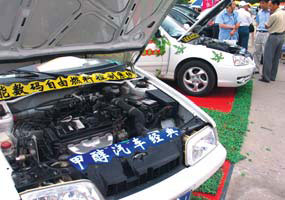Alternative energy needs fueling methanol trials
Updated: 2012-03-05 08:08
By Xu Xiao (China Daily)
|
|||||||||||
|
Car with an engine that can burn methanol at an auto show last year. [Wu Changqing/for China Daily] |
BEIJING - In a move to boost the use of alternative energy, China began trials on methanol fuel in three locales this month, said the Ministry of Industry and Information Technology.
The test program will be held in Shanxi and Shaanxi provinces, and the metropolis of Shanghai, over the next two to three years.
The fuel will be up to 85 percent methanol and the rest gasoline, said MIIT.
Usually produced from wood, methanol is now widely used in racing cars in the US. It can also be made from coal.
One of the test regions, Shanxi province in North China, has rich coal reserves and will as a result have more 40 methanol fueling stations, but the three test areas have experience in developing methanol-related technologies.
Northwest China's Shaanxi province has seven methanol-gasoline blending centers, Xinhua reported.
Officials in Shanghai announced that trials in the metropolis would likely begin with taxis and gradually be introduced into car manufacturing, China Securities Journal reported.
One of the first local automakers to make an engine that can burn methanol is Zhejiang province's Geely Motors, which also makes some of the lowest-priced cars in the world.
China began research into methanol-fueled cars in the 1980s, but development accelerated in 2009 when MIIT boosted research in response to the boom in auto sales, rising crude oil demand and the need for more ecological economic growth.
Zhang Guoyou, an engineer at Shanghai Coking and Chemical Corp, told reporters that methanol made from coal can reduce carbon dioxide emissions up to 70 percent.
Alternative energy is one of seven strategic sectors now receiving government subsidies, with a planned expenditure of 10 trillion yuan ($1.59 trillion) over China's 12th Five-Year Plan period (2011-2015).
- China targets 14% of M2 growth
- China faces many difficulties, challenges
- China to continue property regulation
- The economic challenges facing emerging China
- China's housing loans risk controllable
- China vows to create 9m new jobs in '12
- Workforce limit may affect prices, wages
- Hu urges enhancement of social security









